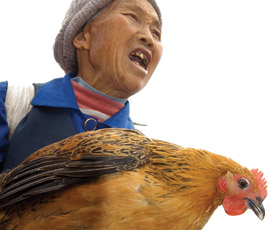Biosecurity must improve to combat bird flu

An outbreak of a new strain of avian influenza in China has prompted calls for people to change how poultry is sold, kept and slaughtered in the country.
A H7N9 strain of avian influenza has been identified for the first time in humans in China, causing six deaths and prompting the Food and Agricultural Organisation (FAO) of the United Nations and others to call for tightened biosecurity measures.
The H79N virus has been laboratory confirmed in 16 cases and of these, six have died. All infections have been in the east of China, and four of the deaths in Shanghai, where Chinese authorities have begun a mass slaughter of poultry in the city’s financial district.
The World Health Organisation (WHO) said that no vaccine was currently available for this subtype of the influenza virus.
But it added that, at this time, there was no evidence that the virus could be transmitted from human to human and the WHO was not currently recommending restrictions on trade or travel.
The FAO said that this particular strain was hard to detect because it caused little or no sign of disease in poultry.
Juan Lubroth, FAO chief veterinary officer, said: “Unlike H5N1, where chickens were dying off on a large scale, with this virus we don’t have a red flag that immediately signals an infection.
“This means farmers may not be aware that virus is circulating in their flock. Biosecurity and hygiene measures will help people protect themselves from virus circulating in seemingly healthy birds or other animals.”
FAO recommended a list of strict biosecurity measures including keeping birds and livestock away from close contact with people, and wild birds, and reporting sick animals to the authorities.
This advice was bolstered by Feng Zijian, head of emergency response at the Chinese Center for Disease Control and Prevention, who said poultry consumption needed to change. “Consumers should no longer pursue the kind of eating habits where they buy fresh chickens that are butchered on the spot,” Mr Zijian told reporters at a briefing held jointly with the World Health Organization. “Stalls and markets in cities where live poultry is being butchered need to be closely monitored as possible venues of infection.”
Industry plans for exotic disease outbreaks
